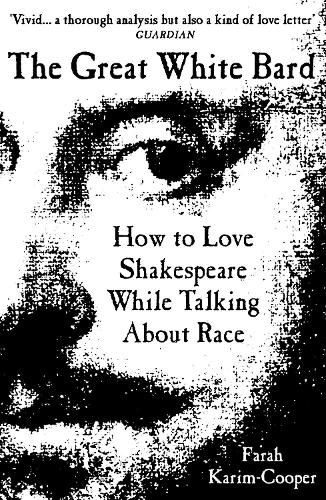Readings Newsletter
Become a Readings Member to make your shopping experience even easier.
Sign in or sign up for free!
You’re not far away from qualifying for FREE standard shipping within Australia
You’ve qualified for FREE standard shipping within Australia
The cart is loading…






'Powerful and illuminating' James Shapiro, author of 1599: A Year in the Life of William Shakespeare, winner of the Baillie Gifford 'Winner of Winners' 2023
'Insightful, passionate, piled with facts and has a warm, infectious love for theatre and Shakespeare running through every chapter' Adrian Lester, CBE
Professor Farah Karim-Cooper grew up loving the Bard, perhaps because Romeo and Juliet felt Pakistani to her. But why was being white as a 'snowy dove' essential to Juliet's beauty?
Combining piercing analysis of race, gender and otherness in beloved plays from Othello to The Tempest with a radical reappraisal of Elizabethan London, The Great White Bard entreats us neither to idealise nor to fossilise Shakespeare but instead to look him in the eye and reckon with the discomforts of his plays, playhouses and society.
If we persist in reading Shakespeare as representative of only one group, as the very pinnacle of the white Western canon, then he will truly be in peril. But if we dare to bring Shakespeare down from his plinth, we might unveil a playwright for the twenty-first century. We might expand and enrich his extraordinary legacy. We might even fall in love with him all over again.
$9.00 standard shipping within Australia
FREE standard shipping within Australia for orders over $100.00
Express & International shipping calculated at checkout
'Powerful and illuminating' James Shapiro, author of 1599: A Year in the Life of William Shakespeare, winner of the Baillie Gifford 'Winner of Winners' 2023
'Insightful, passionate, piled with facts and has a warm, infectious love for theatre and Shakespeare running through every chapter' Adrian Lester, CBE
Professor Farah Karim-Cooper grew up loving the Bard, perhaps because Romeo and Juliet felt Pakistani to her. But why was being white as a 'snowy dove' essential to Juliet's beauty?
Combining piercing analysis of race, gender and otherness in beloved plays from Othello to The Tempest with a radical reappraisal of Elizabethan London, The Great White Bard entreats us neither to idealise nor to fossilise Shakespeare but instead to look him in the eye and reckon with the discomforts of his plays, playhouses and society.
If we persist in reading Shakespeare as representative of only one group, as the very pinnacle of the white Western canon, then he will truly be in peril. But if we dare to bring Shakespeare down from his plinth, we might unveil a playwright for the twenty-first century. We might expand and enrich his extraordinary legacy. We might even fall in love with him all over again.